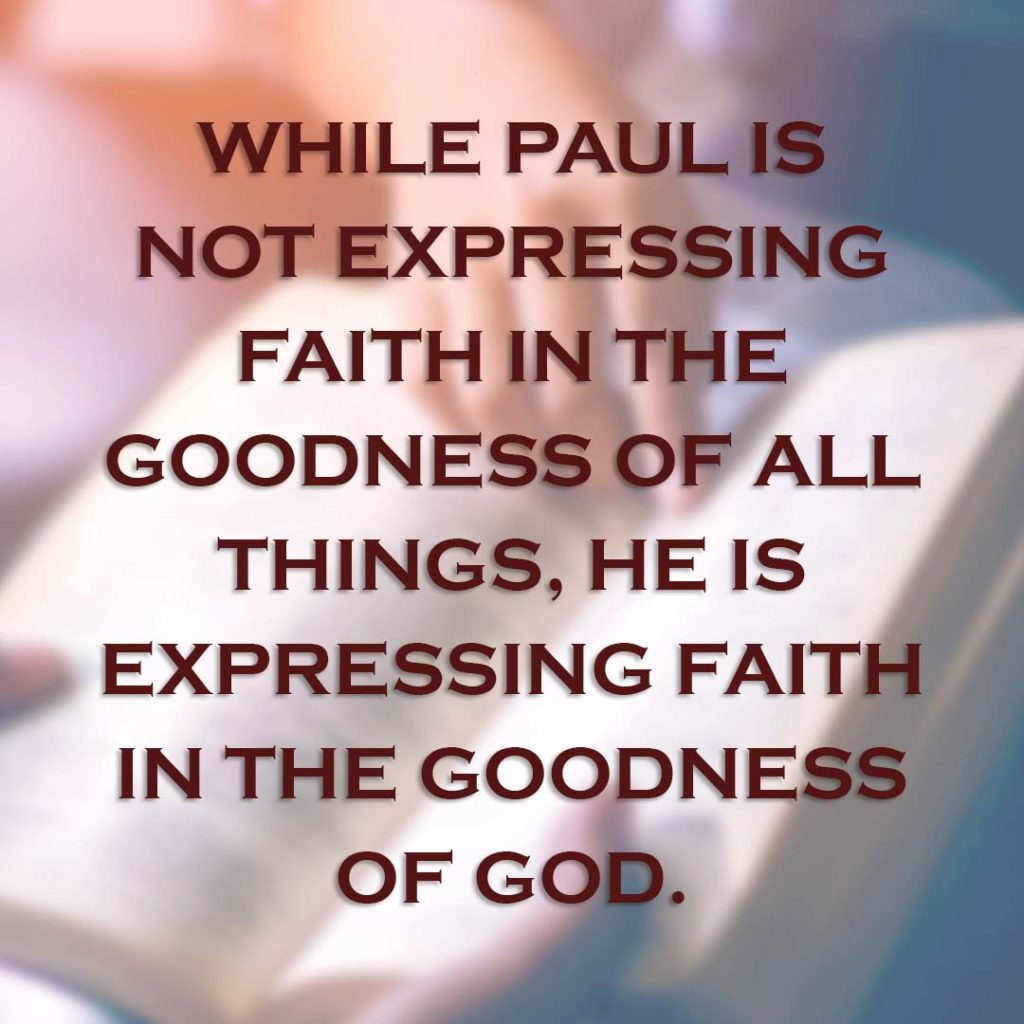Let’s face it: bad things happen to people. Some are the result of poor decisions and improper conduct. Some are the result of national or international crises—like pandemics. No matter how carefully we live, we cannot avoid the pain of unwelcomed interruptions. But Romans 8:28 provides Christians a unique way of processing life when bad things happen to them.
Let’s explore five great truths found within this simple verse that offer the greatest promise in the Bible: “And we know that all things work together for good to those who love God, to those who are the called according to His purpose.”
The Promise Is Definite: “And We Know”
The Promise Is Divine: “That God Works”
The Promise Is Definitive: “All Things”
The Promise Is Dynamic: “Together for Good”
“To Those Who Love God, to Those Who Are the Called According to His Purpose”
The Promise Is Definite: “And We Know”
Romans 8:28 starts with the words, “And we know.” This isn’t a suggestion or a possibility. It is a definite promise. We live in an age where truth doesn’t seem to exist in some people’s minds, but this verse tells us something that we can know without a doubt.
The word “know” is used more than a thousand times in the Bible, and the little phrase “we know” is used five times in the book of Romans alone. Paul says that we can know beyond all doubt that every aspect of our life is in God’s hands and that the Lord will divinely use everything—not only to manifest His glory but also to work out our own ultimate blessing.
This promise is something we know! It is definite. We don’t have to guess about it or have a counselor explain it to us. It is in the Bible, and it is a truth that we both know and trust.
One of the most paradoxical things about being a Christian is this: We are often the most certain about the ultimate when we are the most uncertain about the immediate. When we don’t know how things are going to work out, we can rest on the fact that we know how it will turn out—for God promised that it will turn out for good.

The Promise Is Divine: “That God Works”
The next thought in this marvelous verse is the divine promise that God is working. Even if we can’t see it or feel it, God is working on our behalf.
I read about a pastor who returned to his pulpit ten days after losing his son. He began his message by reading Romans 8:28. He was visibly struggling. But he said, “I cannot make my son’s death fit into this passage. It’s impossible for me to see how anything good can come out of it. Yet I realize that I only see in part. I only know in part…. Still, I believe that… when God has worked out his perfect design, even this senseless tragedy will somehow work out for God’s purpose and to our eternal good.”1
Romans 8:28 doesn’t succeed as a verse if God isn’t working. But praise God that He is! The Lord is ceaselessly, energetically, and purposefully working on our behalf.
The Promise Is Definitive: “All Things”
Next, Paul uses the powerful phrase “all things” to silence those who may claim that painful things in their lives are outside of God’s control. But God can’t be outside of it because “all things” is an all-encompassing statement. What is involved in this promise? As one preacher put it, “All means all, and that’s all that all means!”
Taken in context, this promise allows for no restrictions or conditions. “All things” is inclusive in the fullest possible sense. It includes the suffer[ing] of verse 17 and the groan[ing] of verse 23. In other words, all that is negative in this life has a positive purpose in the execution of God’s eternal plan. Nothing is beyond the overruling and overriding scope of His providence.
We tend to take the events and incidents in our lives and sort them into categories—good things, bad things, unfortunate things. We look at them as individual units, but God sees them all as a part of His ultimate plan. When we begin to understand that God has an overarching purpose for our lives, it begins to free us up in our spirit to know that He is in control, no matter how dire things may seem.
Please note what Paul is not saying. He is not inferring or even suggesting that sickness or suffering or pain are good things. To believe that would be to miss the whole point. While Paul is not expressing faith in the goodness of all things, he is expressing faith in the goodness of God.

The Promise Is Dynamic: “Together for Good”
The following phrase may be the most powerful of all the truths we glean from this verse: “together for good.” Few things frustrate us more than when we can’t see or understand how the pieces of our life fit together. Sometimes when our problems are severe, and we are trying to sort them out, they can keep us up all night.
But Paul uses an interesting expression to describe how God is working on our behalf. When he writes that “all things work together for good,” he uses the Greek word sunergeo. From this term, we get the English word synergism.
Synergism is “the working together of various elements to produce an effect that is greater than, and often completely different from, the sum of each element acting separately. In the physical world the right combination of otherwise harmful chemicals can produce substances that are extremely beneficial.”2 Ordinary table salt provides a simple illustration: It contains two poisons, but when put together, sodium and chlorine become a chemical compound that is essential to our health.
Romans 8:28 is not saying that things will work out perfectly and harmoniously in our lives. It says that God will take the good with the bad and ultimately work it out for our good.
The Promise Is Defined: “To Those Who Love God, to Those Who Are the Called According to His Purpose”
But there’s a catch—this promise does not apply to everyone. It belongs exclusively to those who love God.
Those who love Him.
First Corinthians 8:3 says, “But if anyone loves God, this one is known by Him.” The Bible teaches us how to love God by describing what we do when we love Him. It entails keeping God’s commandments and walking in fellowship with Him. Every day should spill over with evidence of our love for Him.
Do you love God? Are you a Christian? Because a Christian loves God. That is the view from our perspective. Christians love God.
Those who are called.
Here is the view from God’s perspective—we are called according to His purpose. We love Him because He called us. Those who love God are those who are called into salvation by Almighty God.
Because God has called us and we are His children, the incidents in our lives are not incidental. The trials of our lives are not trivial. Whatever is going on in your life, God is up to something. He is working all things together. He is stirring the mix so that what happens in your life is for His glory and your good.
Romans 8:28 reminds us that God has a better plan than any we can make for ourselves. Sometimes it is uncomfortable, and sometimes it doesn’t even make sense to us, but it is always for our good if we love God and are called according to His purpose. That is the truth of Romans 8:28 and the greatest promise in Scripture.
This article was excerpted from Dr. David Jeremiah's Romans VIII: The Greatest Chapter in the Bible study guide.
Sources:
1Richard Exley, “Decent Exposure,” Leadership, Fall, 1992, 118.
2John MacArthur, The MacArthur New Testament Commentary: Romans 1-8 (Chicago: Moody Publishers, 1991), 473.
